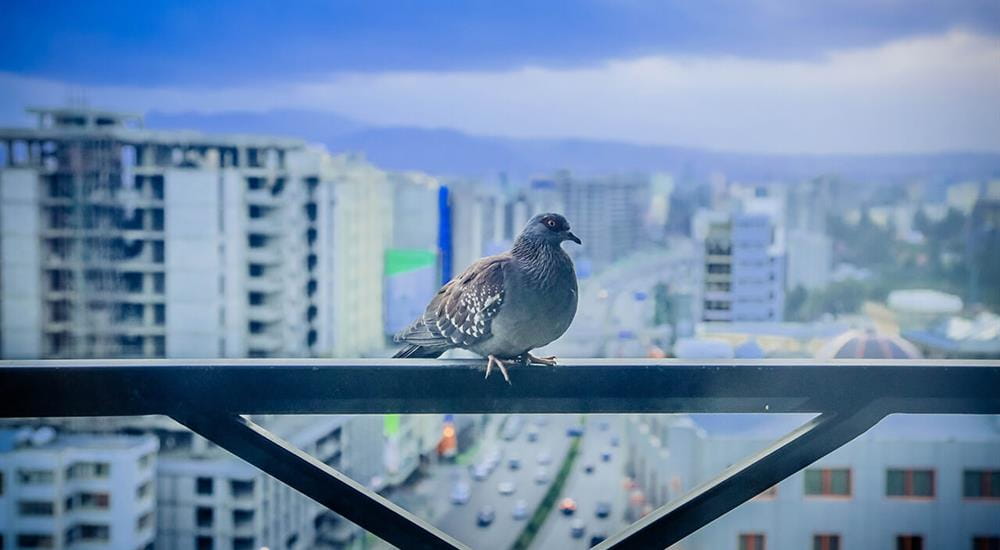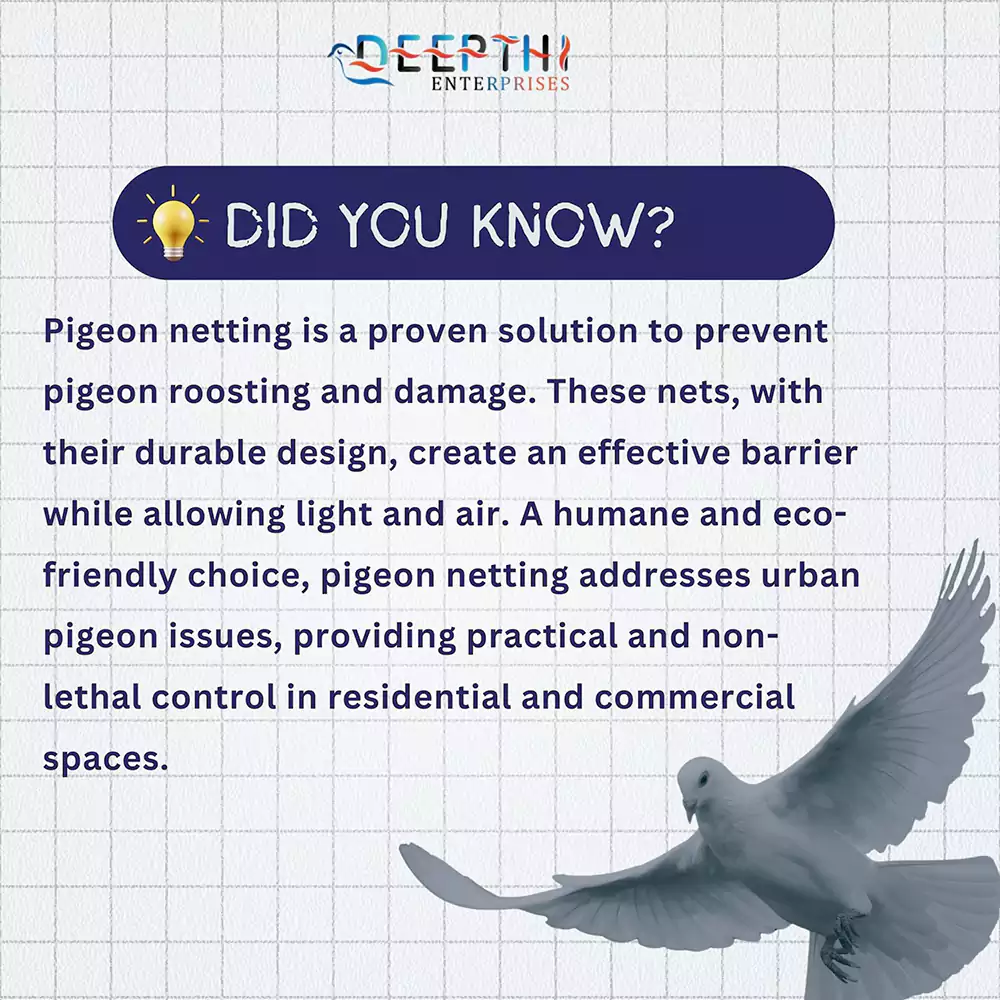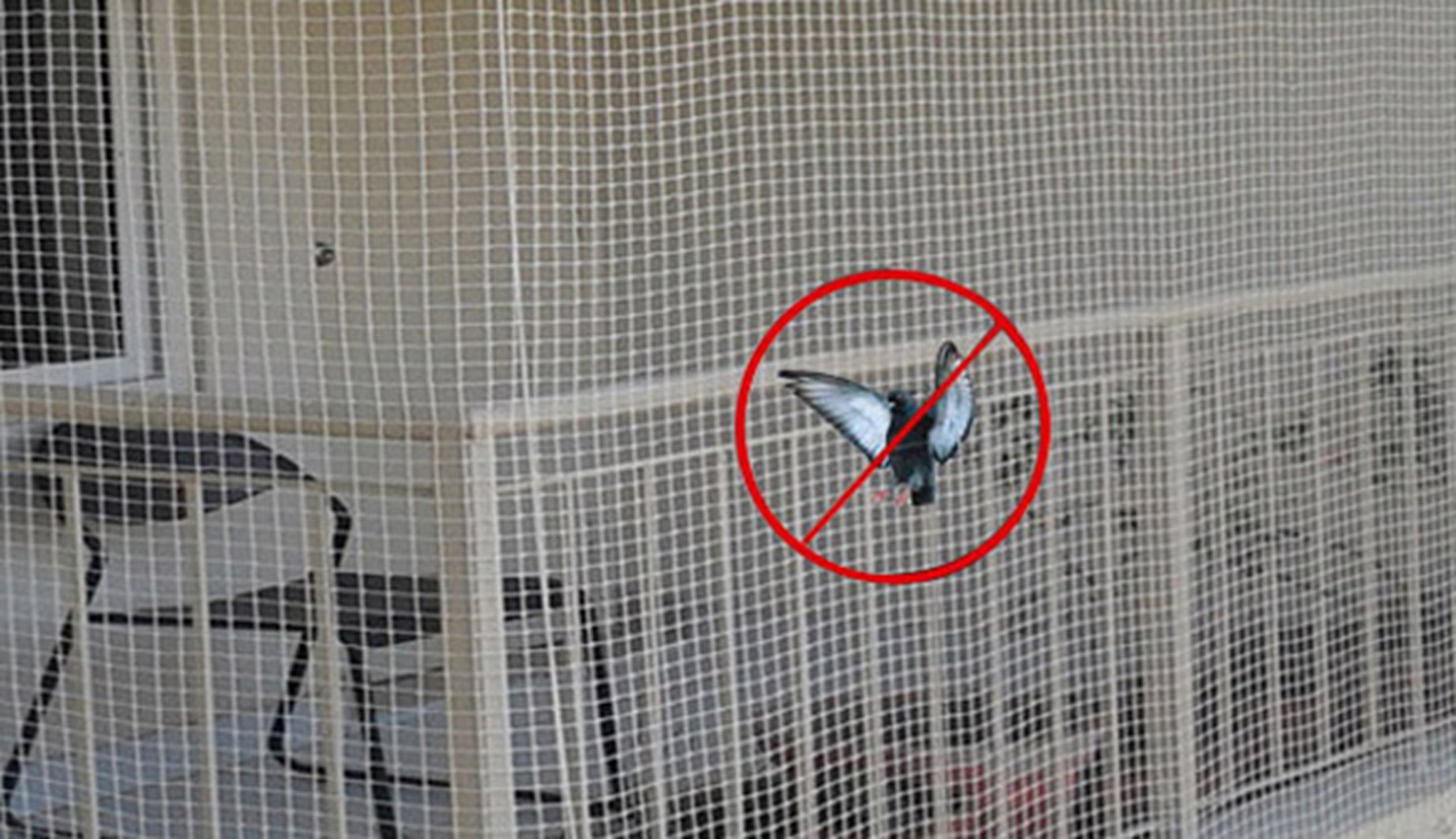Updated on Saturday, January 20, 2024
Every type of business, needs to make sure its place is safe. Whether you have a shop, work in an office building, or have a workshop, you must make sure your place is safe and protected from Pigeons.

Pigeons can be a nuisance to businesses or home. Pigeon droppings are acidic and can corrode metal, damage paint, and disfigure buildings. Pigeons can also carry diseases such as salmonellosis, histoplasmosis, and cryptococcosis.
Pigeon bird netting is an effective way to protect your business from pigeons. It is a humane and environmentally friendly solution that creates a physical barrier that prevents pigeons from landing and roosting on your property.
Can pigeons make you sick?

Sometimes Pigeons can make you sick. Here's how:
1. Disease from Droppings: Pigeon droppings can have germs that cause diseases.
2. Breathing Problems: When birds' droppings dry, they can turn into dust. Breathing in this dust can make you have trouble breathing, especially if you already have problems like asthma.
3. Fungal Infections: Sometimes, there are tiny fungus spores in bird droppings. Breathing in these spores can lead to infections that make you feel sick.
4. Allergies: Some people can be allergic to things in bird feathers, droppings, or their spit. This can cause skin rashes, sneezing, and watery eyes.
Why is Pigeon Netting Necessary?

Without effective protection, birds, especially pigeons, can cause significant damage to buildings and structures. Pigeons are very common, and they cause a lot of property damage every year, especially in cities where there are many of them.
Pigeons creates many problems. Pigeons inside your building make it easier for other pests to come in. Feathers, twigs, and leaves dropped by pigeons can block gutters, stopping water from flowing through them. This means businesses have to spend more money cleaning and clearing the gutters regularly.
What is Pigeon Netting?
Pigeon netting is a humane way to stop birds from getting into your property. It's not harmful to the pigeons, and it works not only for pigeons but for all types of birds.
This special net forms a strong barrier that keeps pigeons away from your building. Once it's in place, pigeons can't make nests on ledges or under overhangs. When pigeons can't get in, they can't block gutters or damage the roof.
But installing pigeon netting correctly is important.
What Does Pigeon Netting Look Like?

Pigeon bird netting can be installed in a way that's not visible from the ground. It comes in various colors, including white, milky white, green and transparent, so it can blend in discreetly. Having netting that's not very noticeable is much better than letting pigeons and other birds nest or rest on your property, which can be more intrusive and cause damage.
The Benefits of Installing Pigeon Nets
Installing pigeon nets offers numerous benefits for both residential and commercial properties. Firstly, these nets provide an effective solution to prevent pigeons from roosting or nesting on buildings. Pigeons can cause significant damage to structures by leaving droppings, feathers, and debris, which can lead to unsightly stains and potential health hazards. By installing pigeon nets, property owners can protect their buildings from such damage and maintain a clean and hygienic environment.
Secondly, pigeon nets act as a physical barrier that prevents pigeons from entering specific areas. This is particularly useful for balconies, terraces, and open spaces where pigeons tend to gather. By blocking their access, pigeon nets ensure that these areas remain free from pigeon droppings and other nuisances. This not only enhances the aesthetic appeal of the property but also creates a more pleasant and comfortable environment for residents or visitors.
Lastly, pigeon nets are a humane solution to pigeon control. Unlike other methods such as trapping or poisoning, pigeon nets do not harm the birds. Instead, they simply deter pigeons from landing or roosting on the protected areas. This makes pigeon nets an ethical choice for those who wish to address pigeon-related issues without causing harm to the birds. Additionally, pigeon nets are a long-lasting solution that requires minimal maintenance, making them a cost-effective investment in the long run.
Contact Deepthi Safety Nets for bird control services today.
You can reach out to Deepthi Safety Nets for bird control services today. They can help you with solutions to keep birds away from your property and protect your surroundings. Don't hesitate to contact them to discuss your needs and get expert advice on bird control. Pigeon net price starts from Rs. 20 per Square Feet onwards.
Frequently Asked Questions
Which net is good for pigeon?
Nylon or polyethylene bird netting is commonly used for pigeon control. These types of nets are durable, lightweight, and provide a physical barrier that prevents pigeons and other birds from accessing areas where they are not wanted, such as balconies, rooftops, and gardens. Mesh sizes in the netting should be small enough to prevent pigeons from passing through. Typically, a mesh size of 2 inches by 2 inches (about 5 centimeters by 5 centimeters) works well for pigeon control.
It's important to ensure that the netting is installed properly and securely to effectively deter pigeons and protect your property. Professional installation may be necessary for larger or more complex areas.
What is the best netting to deter pigeons?
The best netting to deter pigeons is pigeon control netting made of durable materials like nylon or polyethylene. It should have a mesh size of about 2 inches by 2 inches to prevent pigeons from passing through. UV-resistant netting is crucial to withstand sunlight exposure. The choice of color, such as black or stone, can help it blend with the building's exterior. Professional installation is recommended for effectiveness, especially in larger areas. This type of netting creates a physical barrier that prevents pigeons from roosting, nesting, or entering unwanted areas, making it a highly effective solution for pigeon control.
Does pigeon netting work?
Yes, pigeon netting is an effective solution for deterring pigeons and other birds. When properly installed, it creates a physical barrier that prevents birds from accessing areas like rooftops, balconies, and gardens. The netting is made of durable materials, typically nylon or polyethylene, with a mesh size designed to block bird entry. It is also UV-resistant to withstand outdoor conditions. While professional installation is recommended for larger or complex areas, pigeon netting has a proven track record in preventing roosting, nesting, and bird-related damage, making it a reliable choice for bird control in both residential and commercial settings.
What is the cost of pigeon net installation?
The cost of pigeon net installation can vary widely depending on several factors. These factors include the size of the area to be covered, the complexity of the installation, the type of netting material used, and local labor rates.
Which color of pigeon net is best?
The choice of pigeon net color depends on your specific needs and the aesthetics of the area you want to protect. Pigeon nets are available in various colors, including black, stone, and translucent shades. Black netting is often preferred because it tends to blend in well with most building exteriors and is less conspicuous. Stone-colored netting can also be a good choice for buildings with lighter-colored facades. Translucent netting allows some light to pass through and is less visible from a distance. Ultimately, the best color for pigeon netting is one that complements the appearance of your property while effectively deterring birds.
What net is safe for birds?
Safe netting for birds is designed to minimize harm to avian species while achieving the intended bird control goals. Bird-friendly netting features a larger mesh size that allows birds to see and avoid it, reducing the risk of entanglement. It's often made from materials that are more visible to birds, particularly in the UV spectrum, which many birds can perceive. Proper installation, such as suspending the netting above flight paths, further enhances bird safety. Bird-friendly netting is commonly used in settings like gardens, orchards, and wildlife conservation areas to deter unwanted birds while ensuring the well-being of all avian species.
What size mesh for pigeons?
For deterring pigeons, a mesh size of approximately 2 inches by 2 inches (about 5 centimeters by 5 centimeters) is typically recommended. This mesh size strikes a balance between preventing pigeons from passing through while allowing light to pass through and maintaining visibility for the pigeons. Smaller mesh sizes can be more effective at excluding pigeons, but they may reduce visibility and can be less bird-friendly. Larger mesh sizes may not effectively deter pigeons. It's important to consider the specific needs of your pigeon control application and seek advice from bird control professionals to determine the most suitable mesh size for your situation.
What is the net used for birds?
Bird netting, also known as bird control netting, is a specialized type of net used to deter birds from roosting, nesting, or accessing certain areas. It is typically made of durable materials like nylon or polyethylene and comes in various mesh sizes and colors. Bird netting creates a physical barrier that prevents birds, such as pigeons, sparrows, and seagulls, from entering specific spaces like rooftops, balconies, gardens, and agricultural fields. This netting is widely used in both residential and commercial settings to protect properties from bird-related damage and to maintain hygiene and safety. Proper installation is crucial for its effectiveness in bird control.
Pigeon net for balcony near me
To find pigeon netting for your balcony near you, you can start by searching online or contacting local pest control companies or bird control services. They often provide and install pigeon netting solutions.
Pigeon net for balcony installation
To install pigeon netting on your balcony, start by measuring its dimensions and acquiring the necessary materials: pigeon netting, cable ties, and installation hardware. Clear the balcony of any obstructions and identify anchor points, such as railings or walls, where you'll secure the netting. Install hooks, eye screws, or brackets at these points. Unroll the netting over the designated area, securing it tightly to the anchor points with cable ties. Trim any excess netting for a clean fit. Regularly inspect the netting for wear and tear, repairing or replacing damaged sections promptly. For larger or complex installations, consider professional help for proper placement.



